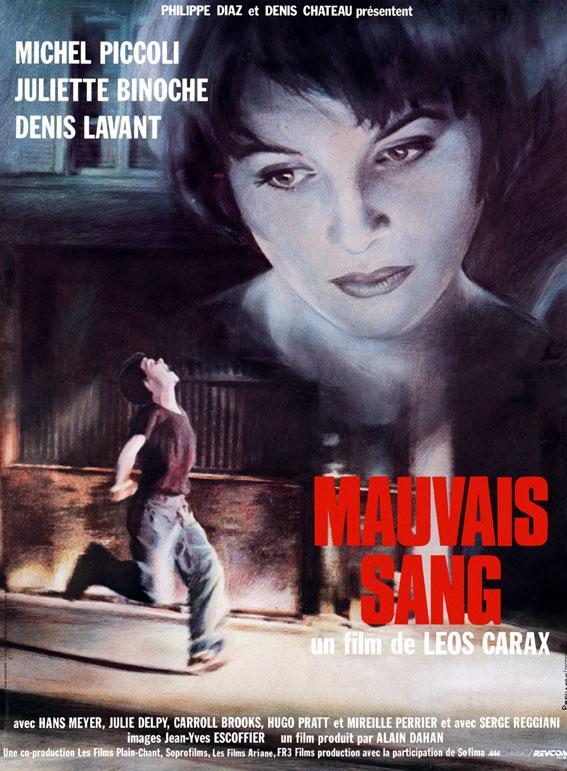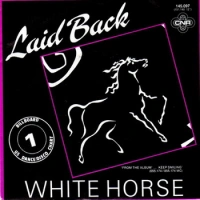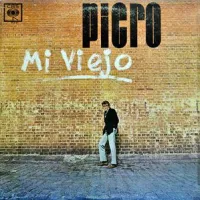
At this time, I have not seen all of Leos Carax’s films. The first I watched – the one that introduced me to his style – was oddly enough his newest, 2012’s Holy Motors. At the time I remember loving it, but I haven’t watched it since it was in theaters and looking back, I’m not sure if it was a movie I legitimately enjoyed more than I was just impressed and taken aback by its strangeness.
In some ways, I’m feeling pretty similarly about Mauvais Sang, his sophomore effort. It’s cinematic qualities are definitely impressive at a surface level, mainly with the photography by DP Jean-Yves Escoffier, who also shot Carax’s films that came immediately before and after this one (Boy Meets Girl and Lovers on the Bridge, respectively). The color palette is tinged with primary colors, strewn throughout each shot and set beside the more bleaker backdrop of grays. The color red especially plays a huge role here, keeping in line with the film’s title, which translates literally to “bad blood”. And this may even apply to our protagonist Alex – played by a young Denis Lavant – who is good with his hands and a real card shark, but still demonstrates prominent qualities of insecurity and even predatory behavior during his introduction in the first third of the film.
Bleakness doesn’t just lie in the background, though. As the narrative goes, Alex is recruited by a couple colleagues of his father, who was killed while attempting to steal a secret serum for public use. Now it’s Alex’s turn to attempt this heist – for which he makes the tough decision to leave his girlfriend and life of comfort in exchange for a life of crime. Additionally, the drug he must retain is a treatment for a disease referred to as STBO, which primarily affects young people who have sex without emotional commitment and eventually leads to death. It’s a pretty blatant allegory for HIV/AIDS, and the biggest crime this film makes is that it does not delve much further into the ailment other than a brief mention here and there. I’m not too sure if that would have been too much of a taboo subject in its time, but it sure would have been an interesting subject on which to go into more depth.
Yet the film’s biggest strength, I think, is how it does not simply dwell onto these bleak subjects. Halfway through, I actually forgot this was supposed to be a heist film, since the majority of the screen time is given to Alex connecting with Anna, played wonderfully by Juliette Binoche. Strangely enough, despite the gray and decay surrounding everything, love is the centerpiece of this weird little tale. This is further emphasized by some brief moments of magical realism, some of which work and others which feel dangerously close to vapid pretension. But still, if there’s any scene from this film that folks who haven’t watched it are aware of, it’s probably the brief moment where Alex sprints down the streets to the tune of David Bowie’s “Modern Love”, a worldwide hit from just three years earlier. It was cleverly appropriated in Noah Baumbach’s Frances Ha, to a much sunnier effect, but the usage of the song here is also a brilliant demonstration of a younger generation’s darting into a world designed for their elders, one which may not be entirely accommodating to young blood and hungry, bleeding hearts.
But once again, as I mentioned above, I’m still not sure if I enjoyed this one as much as I was just impressed by its visuals and methods of storytelling. And even from the storytelling angle, I still felt like I both enjoyed and appreciated Lovers on the Bridge more than this one. Even Lavant and Binoche’s chemistry felt more electric than in this one, which is diminished to mere gazes, a smile here, a tear there. Still, it’s hard to deny the pure cinema in this one: the camera loves its primary colors and Binoche’s face; the dichotomy of feminine tears and masculine aggression eventually reaches a satisfying conclusion; and the ending itself is pretty open-ended, yet somehow optimistic. It’s an unusual film, pretty surreal, and very French – definitely worth a watch.








A Ghost Story was powerful and very original. I like that. It definitely stands out from the crowd. I have yet to watch a few films on your list.. they’re marked to see on my Letterboxd account. Leo Carax is an interesting film-maker… but I think my major discovery recently remains Yorgos Lanthimos who blew me away with “Dogtooth”. I’ve enjoyed a couple of his other films because I love “strange” films in general. Hollywood generally bores me save for the occasional block buster or CG animation (Blade Runner 2049 and most any stop motion animation by Laika studios “Coraline”, or Pixar).